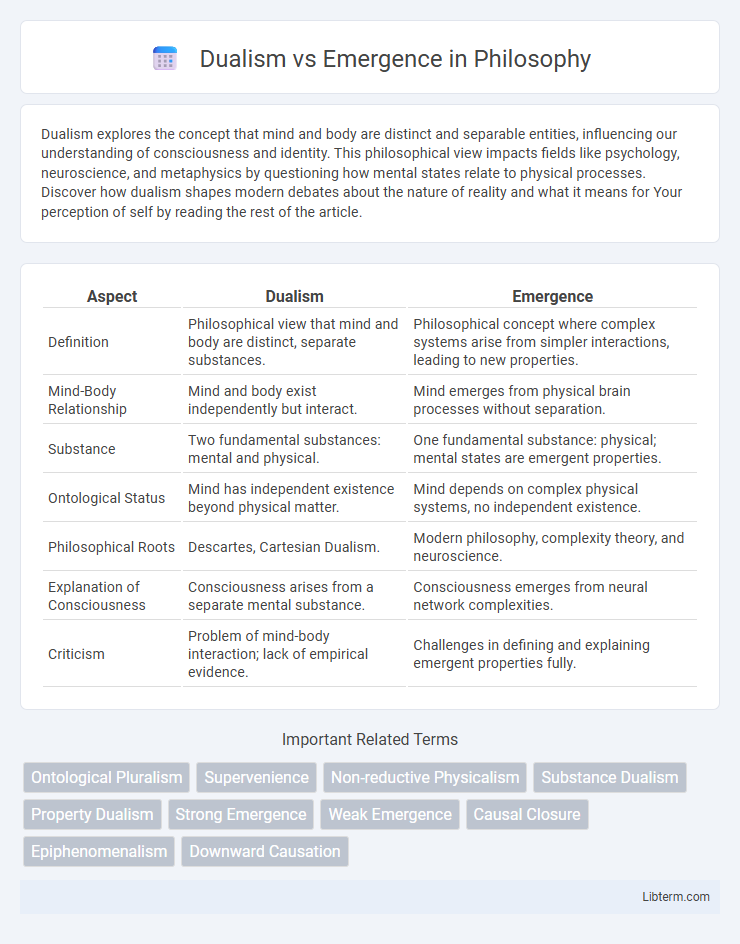Dualism explores the concept that mind and body are distinct and separable entities, influencing our understanding of consciousness and identity. This philosophical view impacts fields like psychology, neuroscience, and metaphysics by questioning how mental states relate to physical processes. Discover how dualism shapes modern debates about the nature of reality and what it means for Your perception of self by reading the rest of the article.
Table of Comparison
| Aspect | Dualism | Emergence |
|---|---|---|
| Definition | Philosophical view that mind and body are distinct, separate substances. | Philosophical concept where complex systems arise from simpler interactions, leading to new properties. |
| Mind-Body Relationship | Mind and body exist independently but interact. | Mind emerges from physical brain processes without separation. |
| Substance | Two fundamental substances: mental and physical. | One fundamental substance: physical; mental states are emergent properties. |
| Ontological Status | Mind has independent existence beyond physical matter. | Mind depends on complex physical systems, no independent existence. |
| Philosophical Roots | Descartes, Cartesian Dualism. | Modern philosophy, complexity theory, and neuroscience. |
| Explanation of Consciousness | Consciousness arises from a separate mental substance. | Consciousness emerges from neural network complexities. |
| Criticism | Problem of mind-body interaction; lack of empirical evidence. | Challenges in defining and explaining emergent properties fully. |
Introduction to Dualism and Emergence
Dualism posits that mind and body are fundamentally distinct substances, with the mind existing as a non-physical entity separate from the brain. Emergence argues that mental states arise from complex physical processes within the brain, without reducing consciousness to mere physical components. The debate centers on how consciousness and mental phenomena relate to the physical world and whether mental properties can be fully explained through neuroscience or require a distinct ontological category.
Historical Background and Philosophical Roots
Dualism, rooted in Plato's theory of forms and extensively developed by Rene Descartes in the 17th century, posits a fundamental distinction between mind and body as separate substances. Emergence, influenced by 19th and 20th-century developments in biology and philosophy of science, challenges this view by proposing that complex properties arise from simpler physical systems without reducing to them. Classical dualism reflects metaphysical concerns of substance and consciousness, while emergence aligns with scientific paradigms emphasizing hierarchical organization and novel system properties.
Defining Dualism: Core Principles
Dualism posits that mind and body are fundamentally distinct substances, where the mind is non-physical and the body is physical, operating independently yet interacting. This philosophical stance is rooted in the ideas of Rene Descartes, emphasizing mental phenomena as irreducible to physical processes. Core principles of dualism highlight an ontological division, asserting consciousness cannot be fully explained by materialistic science.
Understanding Emergence: Key Concepts
Emergence refers to complex patterns or properties arising from simpler interactions within a system, which cannot be directly predicted from individual components alone. This concept emphasizes relational dynamics where collective behaviors exhibit novel qualities, contrasting with dualism's strict separation of mind and matter. Understanding emergence involves exploring non-reductive causal relationships and the integrative processes that give rise to consciousness and higher-order phenomena.
Comparing Ontological Assumptions
Dualism posits two fundamentally distinct substances: mind and matter, asserting that mental phenomena are non-physical and exist independently from the brain. Emergence, however, assumes a single physical substance where complex mental states arise from but are not reducible to underlying neural processes. These differing ontological assumptions impact how consciousness is explained, with dualism emphasizing separation and emergence highlighting interdependence within a unified physical framework.
Mind-Body Problem: Dualist vs Emergentist Perspectives
Dualism posits that the mind and body are fundamentally distinct substances, with the mind existing independently of physical processes, often emphasizing a non-physical soul or consciousness. Emergentism argues that mental states arise naturally from complex neurobiological interactions, suggesting that consciousness emerges from brain activity without requiring a separate substance. The mind-body problem centers on how immaterial mental experiences relate to the physical brain, with dualists advocating for ontological separation and emergentists supporting a scientifically grounded, hierarchical causation model.
Scientific Implications and Evidence
Dualism posits that mind and body are fundamentally distinct substances, challenging empirical methods by suggesting non-physical mental phenomena beyond scientific measurement. Emergence theory argues that complex mental states arise from physical brain processes, supported by neuroscientific evidence demonstrating correlations between neural activity and cognitive functions. Scientific implications of emergence favor testable hypotheses and measurable phenomena, while dualism often encounters limitations in providing falsifiable predictions within experimental frameworks.
Critiques and Challenges for Dualism
Dualism faces critiques regarding the interaction problem, questioning how immaterial mind and physical body influence each other without detectable causal mechanisms. Neuroscientific evidence challenges dualism by showing correlated brain activity underlying mental states, undermining the notion of a separate, non-physical mind. Philosophical challenges also include the difficulty of explaining mental causation and the exclusion problem, where physical processes account fully for behavior without necessitating a dualist entity.
Critiques and Challenges for Emergence
Emergence faces critiques centered on its explanatory power, as skeptics argue it struggles to fully account for how complex properties arise from simpler physical components, often labeled the "hard problem" of emergence. Challenges include defining clear causal mechanisms that link emergent phenomena to their underlying substrates without resorting to reductionism or invoking mysterious forces. The debate also highlights difficulties in empirically validating emergent properties, with some critics asserting that emergence may be a descriptive concept rather than an ontological reality.
Conclusion: Synthesis and Future Directions
Dualism and emergence offer contrasting frameworks for understanding consciousness, with dualism positing a fundamental separation between mind and matter, while emergence explains consciousness as a complex result of physical processes. Synthesizing these views encourages interdisciplinary approaches combining philosophy, neuroscience, and computational modeling to deepen insights into the nature of consciousness. Future research will likely focus on refining emergentist theories with empirical data and exploring potential reconciliations with dualist perspectives to advance the study of mind-body interaction.
Dualism Infographic

 libterm.com
libterm.com